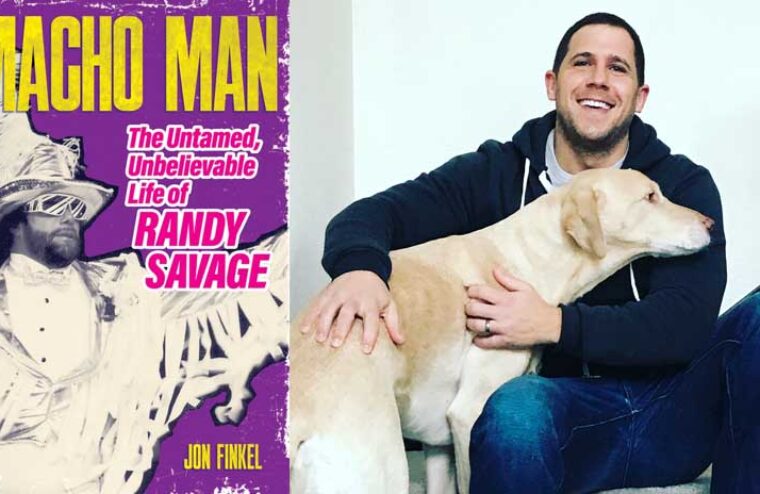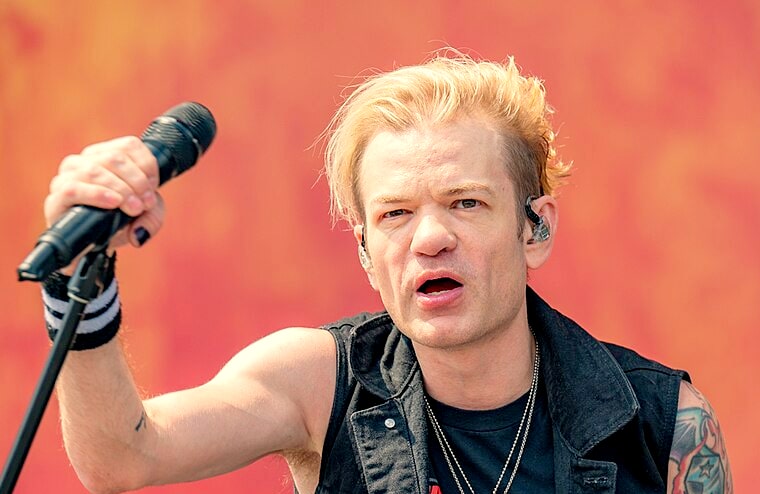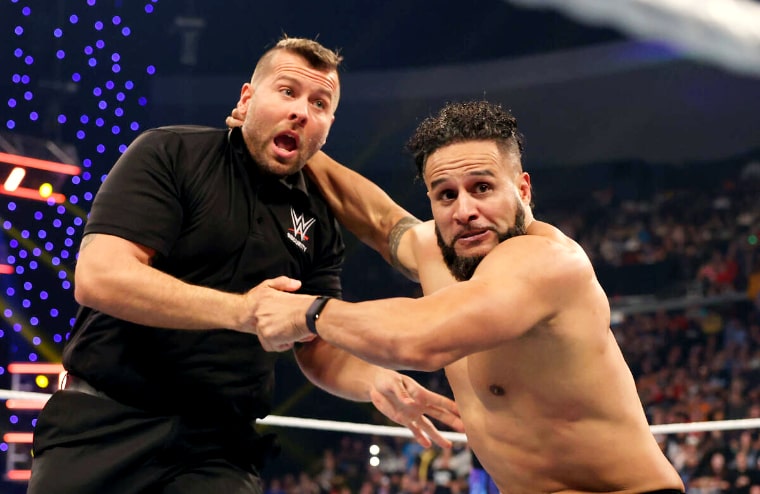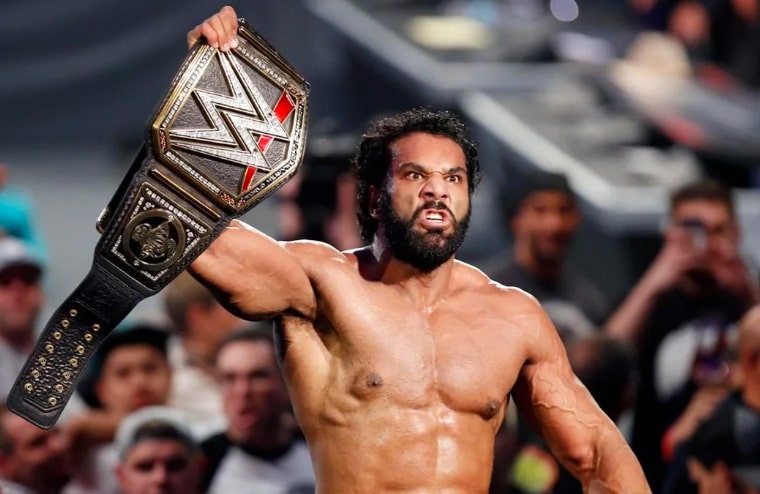Even the most casual of wrestling fans knows of the dedication, determination and sometimes obsessiveness of the late, great Macho Man Randy Savage. He made it his life’s work to excel both in the ring and on the mic, and the lasting impression he’s made continues to live long after his untimely passing. Stories of the great lengths Savage would go in preparing matches and blurring the lines between fantasy and reality are a staple of wrestling folklore, and few, if any other professional wrestlers in history left as indelible a mark as the Macho Man.
Far less known, however, was the great heartbreak of Savage’s life. Without it, the world may never have experienced his greatness. And while his breakup with Miss Elizabeth was indeed a difficult aspect of Savage’s too short 58 years on this earth, that’s not what author Jon Finkel is talking about via phone for a Web Is Jericho exclusive.
“The most surprising thing I learned about Randy was how dedicated he was to his baseball career,” Finkel said. A veteran author of numerous award-winning books, Finkel’s new bucket list biography, “Macho Man: The Untamed, Unbelievable Life of Randy Savage” (ECW Press), delves deeper into Savage’s psyche and life than any book or documentary that has preceded it.
“It’s very hard for all of us who grew up watching Macho Man to understand, there was no long-term plan to even be in wrestling,” Finkel continued. For Savage, then simply known as Randy Poffo, it was all about making it in baseball. “He was hellbent from the time he was probably 12 through his early 20s and until there was just nowhere else to go and no more spots on a minor league roster to take. He finally had to switch over to wrestling.”
Finkel goes into great detail about Savage’s passion for the diamond. “He was as obsessive-compulsive about baseball as he was about anything else,” Finkel said. “I always just assumed he had these two options. He’s an incredible baseball player, but if that doesn’t work out, ‘I have my dad doing wrestling, my brother doing wrestling, and it’s fine.’
But things were far from fine.
“He was devastated,” Finkel said of when Savage had to give up his baseball dream. “It was like pure heartbreak. It was like an existential crisis. This was a kid — and I talked to all his high school teammates and all his neighbors and a lot of guys who played minor league ball with him — this was a kid who walked around high school with his backpack and his baseball bat. Who sat in the back of class not to goof off but to do tricep kickbacks with a weighted baseball. It informed who he became as a wrestler and how he transitioned over first to Randy Savage and then the Macho Man. When you talk about surprising, I just didn’t realize it was so cut and dry. There was no talk of wrestling, Baseball was it.”
Savage’s heartbreak came at the benefit of the wrestling masses, as it led him to the squared circle and to the legendary career fans around the globe still enjoy to this day.
Finkel’s new book is set for an April 2 release and is available for pre-order now. Recently, the veteran scribe chatted at length with Web Is Jericho about everything Randy Savage and everything Macho Madness.
How did baseball prepare Randy Poffo to become Randy Savage and then the Macho Man? “Everything after baseball, the way he approached it — the preparation, the mindset, the actual work ethic, the ability to drop everything else and focus — that came from baseball. He honed his chops in every possible way. From studying pitchers to studying wrestlers; to getting in shape for baseball to now doing football workouts; checking out what was going on in the outfield as a catcher to reading the stands in a stadium. That was his prep to become the wrestler. Obviously growing up with Angelo Poffo as his dad was huge, but you can’t tell his story without really understanding what people said about him then. Personality-wise, you can’t appreciate the invention of the Macho Man character without understanding that while he was a top prospect in high school and the big man on campus and also as a minor league baseball player, he was quiet and soft spoken. And so many people that I talked do didn’t have too much to say about him because he didn’t say anything back then. One of the guys said, ‘He was just another clean-shaven goof trying to play baseball.’ And then, he goes from this 185-pound sinewy baseball player and puts it down. The dream’s dead. And I joke, it’s not like he was gonna go into finance. Then he goes on a year-and-a-half journey to transform his body to actually become a wrestler.”
How did the book come about? “This is a bucket list biography for me. This is my 10th book, and I’ve always wanted to tackle the Macho Man biography. For me, it was a Mount Everest biography. You don’t go after that first, so I wanted to make sure I was ready for it. I was lucky enough in my early writing career to write for Muscle Fitness and Mens Fitness and a lot of the GQ men’s magazines, and I’d done a bunch of cover stories with WWE guys — Batista, HHH, Brock, and some of the UFC guys. I’ve always been fascinated with it, but I grew up the biggest Macho Man fan you could find. I was 7-8-9-10 years old as he’s the Intercontinental Champion and as he’s going on to Wrestlemania III. I used to call myself ‘Little John Studd’ after Big John Studd. I was so into it. From a fan perspective, I couldn’t have been more into Macho Madness as a kid. And professionally, you’re looking for topics that fascinate you and are 1 of 1s. I look for biographies or topics that are truly of unique times and people, and there’s nobody more unique than the Macho Man.”
What was the most challenging aspect of writing the book? “No. 1 was getting Lanny Poffo on board with conversations, only because of getting in touch with him. But (once I did) there was no problem with him getting involved. I had just finished a proposal. I had written a book before this called ‘1996: A Biography,’ which was a biography of the entire sports year of 1996. And I did one chapter in that book on the debut of The Rock and Stone Cold. So I had interviewed JP Zarka of Pro Wrestling Stories who had known Lanny and done some work with him. When I finished the proposal, I had some publishers interested, and I just didn’t feel comfortable moving forward without knowing that I could interview Lanny. With so many people in wrestling who have passed, and in this particular case Angelo Poffo, who was a major player in wrestling in the ’50s and ’60s, Judy Poffo also passed away, Randy was dead, Liz is dead. So many people that were critical to this family were gone. As the torch bearer, I just couldn’t imagine moving forward without Lanny.”
“Obviously Lanny has passed since. But at the time, it was like ‘How could this book come out if he’s still around?’ First thing anybody who knows anything about wrestling would say, ‘Did you talk to Lanny?’ If my answer was no, I’d almost feel like a fraud. The proposal kicked around for a year or so until JP vouched for me, and I got in touch with Lanny. Once we spoke and had a couple fun exchanges about my last name, Finkel, I guess I passed whatever test there was. We spoke for hours and hours, and he was just wonderful to talk to. I dedicated the book to him. It was really devastating that he passed in the middle of it. I think this would’ve been a fun moment for him.”
What was Lanny Poffo like in your experience? “I only met him in the last nine months of his life, and I’m not gonna pretend to know him any deeper than that. He was living in Ecuador. We had some long conversations. He was in on the idea of giving an even-handed look at Macho. He was always leery of sort of wrestling media in general. He’d seen the documentaries that had come out, and they kind of kept going to the same four or five names who told the same stories and had the same agendas for the last 20 years. He liked that I was from a traditional journalism and traditional sports background. I did a book on Mean Joe Greene and Charlie Ward and some other athletes. He knew that I know how to do all the interviews and all the research, and I wasn’t just gonna go to the same pack of seven people. That was part of what I told him. By the time I spoke to him I had already spent months at that point in the newspaper archives. I said, ‘I don’t just have a list of questions. I have 50 newspaper articles in print of things you guys said and things your father did, and I found some really cool stuff.’ And I think he realized I wasn’t coming at it from, ‘What’s the spiciest thing I can find and just throw out there?’ like a lot of those docs. It was really a full look at his life and his family and how he became the icon that we all love.”
What’s an aspect of Randy’s personality that people overlook? “He was very smart. It’s easy to look at the neon costumes and the cowboy hats and the spinning and twirling, the cut shirts and everything we love, frankly. All the pomp and circumstance of him — on purpose, by the way — was all calculated. He was an honor roll student in high school. Lanny and some of the other guys have stories of how he just cleaned out these guys in the minor leagues playing poker. He wasn’t a bonus baby. Meaning he wasn’t drafted by a team, so he made almost no money, a couple hundred bucks a week playing minor league ball. And Lanny told me while most of the guys in his shoes were calling home for money or seeing how could they make money on the side, Macho was just taking their money in cards, and he never needed money on the side. Hacksaw Jim Duggan was also telling me that Randy was surprisingly an excellent chess player. They had these long-running chess games where Hacksaw would just get destroyed. He was very cerebral, and when you understand the pivots of why he went from Randy Poffo to Randy Savage to Macho Man, everything was calculated. He was just so smart. He was smaller, and even when he got up to 230, 240, he was still small by wrestling standards. So how can he look bigger? He puts on giant capes and gowns and hats. And you watch him, he’s really walking on tippy-toes half the time, and he really never stands still. All of it is to kind of hide the fact that he’s not Hulk Hogan’s size.”
What was your biggest takeaway from Randy’s relationship with Elizabeth? “My favorite thing about their relationship from everything I read is that they met like any meathead is gonna meet a pretty girl. He was a gym rat. The gym became his sanctuary for everything. He was committed every day to getting bigger and stronger. He wouldn’t travel anywhere without knowing which gym he was gonna go to. There’s these crazy stories from the territory days where he would drive hours to go beyond crappy gyms to the gyms he liked. He was just nuts about this. One morning he’s walking into a gym in Kentucky, the same gym he went to every morning at like 6 a.m. depending on if he had a show. One day he’s walking in, and normally it doesn’t matter who’s behind the counter. They say ‘Have a good workout,’ and you say ‘You too’ or nod. One day he’s walking in and there’s this beautiful, brown haired, brown eyed girl. He tells the story that it was love at first sight, because what was there not for her to love?”
What was your biggest takeaway from Randy’s relationship with Hulk Hogan? “The big things that have been covered is how they were best of friends and then they hated each other, then they would freeze each other out and make people pick sides. That stuff has kind of been told ad nauseam, and it does fit into the narrative of their relationship, and they did reconcile a little towards the end. The thing I appreciate more about Macho now having written this, is that even the year-plus that Macho was champion in the Mega Powers, with everything they did, they never really gave him the full spotlight. Hulk was always there. Macho never pinned Hogan. I feel deeply in my bones, whatever friendship he had with Hogan aside, professionally he definitely had to have had a bigger gripe with him, because there was all these angles they could have done. And Macho was a great storyteller. Maybe the best of all time. And they never did the flip angle of, ‘What if they didn’t have him lose, and the Mega Powers didn’t implode right away?’ They never did the angle of Hogan being a little jealous. I think they lost a year-plus of a really good angle where Hulk was maybe just a little bit concerned that Macho had the spotlight. And because they didn’t do that, it’s surprising to me that Macho was as good a sport he was with as short a tenure he was allowed to have. You realize they kind of did the biggest thing, and that was the only thing they did. They did a great job with the story they did, and they maxed out the choice they made. But it’s only after you give them credit for that, they could’ve done that particular angle anytime. There was a year in there where they could’ve brought in a bunch of different angles where Macho was clearly the 1A alpha, and maybe he doesn’t give Hulk a shot? They didn’t do any of those things that would’ve been so fascinating.”
You mentioned what you felt Lanny would think of the book. What do you think Randy would say if he read this? “I’ve thought so much about that. I think this is the only full telling of his life. If you listen to interviews, some of the most candid interviews he did were when his rap album came out. He had been out of the spotlight for a bit. It was definitely the first time that some people had even thought of talking to him in some time. And he did some pretty good interviews about his legacy and about what was going on. At that point he hadn’t jumped into what I called his serenity phase — the last few years of his life. I think he just didn’t get how much he was adored. He was focusing on what didn’t happen. I spent so much time on his passions. We spent time on his father, who he worshiped, and his relationship with his mom and brother and baseball. We do a full evaluation of his life and who he was. I think he would’ve thought it was fair. I think he would’ve loved the cover. I think he would’ve found things to add, but he was very clever. He tells stories three or four different ways, as we all do, but he’s in the spotlight. So if one part of the story gets a better reaction, he’s gonna tell that part differently and add a thing that’s good and drop a part that wasn’t. So when it comes to that kind of stuff, I don’t know if there’s anything he would’ve challenged. And most newspapers and print back then were in the business of actually doing real work. I assume the Tampa Tribune from 1974 had no angles like they do today, they were just trying to do what they were doing. I think he would like it, and I think he would think it’s fair.”
Order “Macho Man: The Untamed, Unbelievable Life of Randy Savage” via ECW Press.
- Sum 41 Frontman Reveals Why Band Is Ending - April 27, 2024
- Nikki Sixx Elaborates On Mick Mars Leaving Motley Crue - April 27, 2024
- Ozzy Argues Case For Legendary Band To Enter Rock Hall - April 26, 2024




